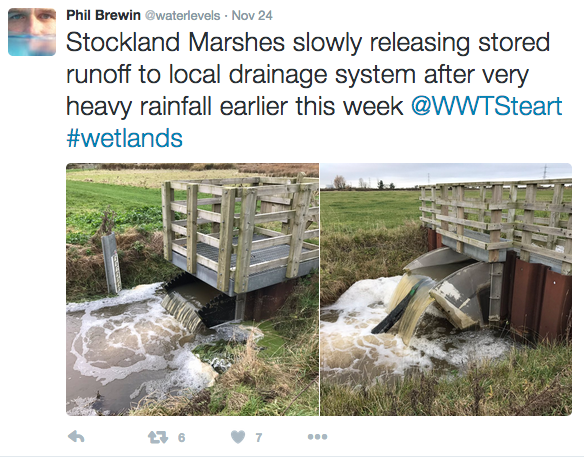
Farmland used to prevent downstream flooding
While there is still nothing new coming from the Government on what a post- Brexit farm policy will look like, The Farmers Unions are gearing up to have their say – and they will expect to have the lion’s share of the conversations with and influence over Government Departments at UK and devolved administrations.
The National Farmers Union, long known as a fully deniable department within the Department for the Environment Food and Rural Affairs, has not yet publicly announced its proposals for the new farming policy, though its President had “robust” discussions with Defra Secretary of State Andrea Leadsom on monday. NFU are very worried indeed that English farmers will lose access to the Single Market under a Hard Brexit. If this happens tariffs will be introduced making our food more expensive for our EU neighbours to import. There would go some highly lucrative export markets.
Meanwhile in Wales on monday, the Farmers Union of Wales launched their Brexit Briefing Paper – except they haven’t actually made it available to the public (yet). I was looking forward to reading what they were proposing, but had to make do with a load of press releases instead. One thing did catch my eye.
The FUW claimed that World Trade Organisation rules prevent a Welsh or UK Government adopting a “farm payments for public goods” approach, to replace the awful Common Agricultural Policy.This is what they said:

Curious, I looked up the relevant wording in the WTO (annex 2 para 12). This is what it says:

That looks pretty clear to me – WTO rules, as you would expect, do allow payment for public goods – as long as those payments reflect additional costs, loss of income and have clearly defined benefits for the environment.
So if a farmer was paid to alter the way they farmed their land – to reduce downstream flooding for example; and this involved capital spend on eg blocking drains or creating new wetlands; and there was a quantifiable loss of income because there was less arable or pasture land to produce food, then WTO rules would allow those payments to be made.
Am I missing something, or is the FUW deliberately trying to portray a “public goods for public money” approach as breaching trade rules?

Maybe FUW means that positive payments for public goods are not permissible under WTO rules; and that, as with EU agri-environment payments, these may only be calculated negatively, as in compensatory payments for notional profits foregone by the individual, which is the basis on which EU agri-environment payments (e.g. Glastir in Wales) are also calculated. I had thought this was a particular EU CAP “perversity”, but I now surmise that the EU may simply have been adhering to WTO rules.
thanks Dave. The position re WTO rules is, typically, unclear. I have had a number of different suggestions today – most of them contradicting each other. The one that sticks in my mind just at the minute is that developed countries tend to do what they like and ignore WTO rules. Others have also suggested that CAP direct payments and greening payments may well be in breach of WTO rules but no-one is going to challenge them.
What FUW appear to be doing is conflating payments for public goods, with agri-environment scheme payments. This may be deliberate, or may just mean they haven’t considered the two being different.
Until now I’d never understood why Agri env schemes paid on the basis of income foregone, rather than benefit delivered. WTO rules thus appear to prevent any form of inducement (over and above income foregone) to farmers to provide public goods.
thanks Charles. I’ve had a number of differing views on what the WTO rules allow or do not allow, regarding public goods or environmental schemes.
Here’s one from former Defra civil servant and CAP expert Martin Nesbit “WTO constrains design of public goods payments eg can’t always reflect full external benefit. But they’re clearly allowed.”
Others have suggested that as a ‘blue box’ issue the WTO hasn’t really made any decisions on payment for public goods, as opposed agri-environment.
Interesting that the WTO rules state that payments should be limited to ‘extra costs OR loss of income’ and do not say ‘extra costs AND loss of income’.
thanks Matt – yes the wording is suitably woolly.
Pingback: What is the public paying for? Guest post on farm subsidies from Tom Lancaster | a new nature blog
Pingback: #AfterCAP | UK | What is the Public Paying For? | ARC2020